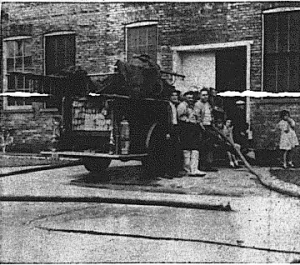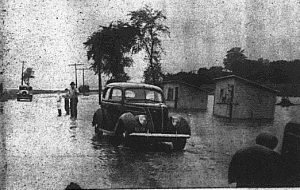For many years, Libertyville’s biggest problem was probably flooding. Natural bodies of water such as lakes and rivers are often fun or picturesque. However when the conditions were right they could quickly turn into a terrifying site, enveloping roads, businesses and homes. The Libertyville area is known to have approximately 50 floods, ranging from minor inconveniences to life threatening. These seem to mainly have stemmed from two different areas: Butler Lake and the Des Plaines River.

One of the more notable floods happened in July 1938. This flood seemed to have a two pronged attack hitting areas around both Butler Lake and the Des Plaines River. Caused by a tremendous amount of rain in a small window of time, rain water accumulated quickly. Some residents were surprised when they left for work and found they couldn’t reach their cars due to the flood waters. This flood was thought to have about $1 million worth of property damage and $35,000 of that came from property from Fould’s Milling Co. The Fould’s factory was located on Church St. and was right next to both the Des Plaines River and Liberty Lake. Most of the damage occurred when the basement of the factory flooded destroying thousands of dollars’ worth of products. The Libertyville Fire Department sent their truck in to help syphon out water, with many fireman and volunteers working through the night to get the basement clear again. While the folks at Fould’s were dealing with their issues, Butler Lake was causing problems of its own.

During the Great Depression the federal government sponsored thousands of WPA programs across the country. One of these programs was right here in Libertyville: building a bridge on Lake Street that would cross one of the main tributaries of Butler Lake. During the bridge’s construction flooding looked like it was going to be a problem, so the workers constructed a quick makeshift dam to help quell the waters. However, with all of the rain water being added to the lake, the pressure become too much. The dam was pushed northward 6 inches and was soon replaced temporarily by sand bags. Lake Street, parts of which run adjacent to Butler Lake, had rain water run over the street in three different places. Lake Street had to be closed until repairs could be made to the bridge. Within a couple of days the floods all receded and things started to get back to normal. People cleaned up the mess that was left over, farmers tried to do what they could for their crops and the remaining large bodies of flood waters receded. It must be noted that only one life was lost during the flood despite the fact that the waters rose so quickly.

The flood of 1938 wasn’t the first flood in Libertyville, but it seemed to be the first that illustrated what a problem flooding could be. Officials for the town realized that something needed to happen to curtail the flooding and damage. However, no one could seem to agree on what should be done or ultimately whose responsibility it was. About 25 years later, Libertyville would have two floods in three years that were worse than their 1938 predecessor but it would be years beyond that before any government action would take place to address the prevention of flooding. Get your waders on and stay tuned for future flooding blog posts.

Sources
- “Villagers Ask Action To Curb Flood Damage.” Libertyville Independent, July 8, 1938, p. 1
- “Waters Flood County; Damage High.” Libertyville Independent, July 7, 1938, p. 1, 4.
- “Lake County Maps Online.” Lake County Maps Online. Web. 26 May 2015. http://maps.lakecountyil.gov/mapsonline/
- “Waters Flood County; Damage High.” Libertyville Independent, July 7, 1938, p. 1, 4.
- “Villagers Ask Action to Curb Flood Damage.” Libertyville Independent, July 8, 1938, p. 4.
- “FLOOD LOSSES HIT $3,000,000; TRAFIC TIED UP.” Chicago Daily Tribune (1923-1963), Jul 02, 1938. http://search.proquest.com/docview/182067407?accountid=44868.
Discover more from Cook Memorial Public Library District
Subscribe to get the latest posts sent to your email.
Categories: Local History
Tags: Local History
